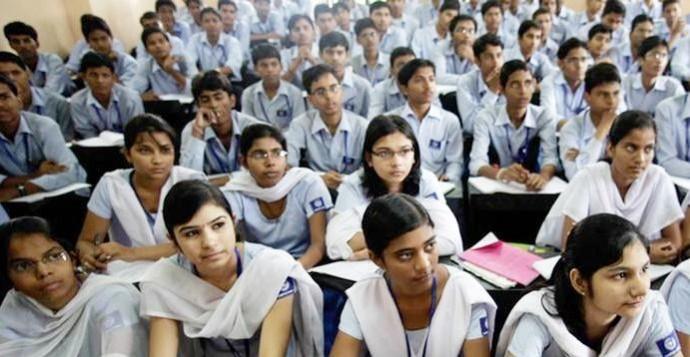
India's educational landscape is witnessing a significant transformation, as revealed by the Economic Survey 2023-24. The survey, tabled in Parliament by Finance Minister Nirmala Sitharaman, provides a comprehensive overview of the country's educational ecosystem. The data presented in the survey underscores the magnitude of the task at hand and the inherent ambition of the New Education Policy 2020.
The survey reveals that India is home to 26.52 crore students in schools and 4.33 crore in higher education institutions. This staggering figure is further supplemented by more than 11 crore learners in skilling institutions. The New Education Policy 2020, which aims to transform India's educational ecosystem, is at the heart of these developments.
The policy's primary focus is on strengthening institutional capacity to embed lifelong learning in the education and skills ecosystem. This focus is evident in the Poshan bhi Padhai bhi programme, which aims to develop the world's largest, universal, high-quality preschool network at Anganwadi Centres.

The New Education Policy 2020 is leading an across-the-board transformation in the education sector. The policy emphasizes foundational literacy and numeracy for every child passing the third standard. This initiative is designed to prepare children for future learning and help them work with emerging technologies while overcoming the accumulated education and skill deficits, accentuated by the pandemic. The survey also highlights the rise in enrolment in higher education, driven by underprivileged sections such as SC, ST, and OBC. A noteworthy trend is the faster growth in female enrolment across sections. Female enrolment in higher education has increased to 2.07 crore in FY22 from 1.57 crore in FY15, marking a 31.6 per cent increase since FY15.
This growth in female enrolment signifies a move towards greater equity in higher education, opening up better employment opportunities for previously disadvantaged sections. The Economic Survey also underscores the importance of educating and skilling India's youth to sustain economic growth over a quarter-century.
The survey highlights the rapid progress India is making in Research and Development (R&D). Nearly 1,00,000 patents were granted in FY24, compared to less than 25,000 patent grants in FY20. According to the World Intellectual Property Organization (WIPO), India saw the highest growth (31.6 %) in patent filings in 2022. India's rank in the Global Innovation Index (GII) has consistently improved from 81st position in 2015 to 40th in 2023. The government has recently decided to increase the scholarships for students pursuing PhD and Post-Doctoral research. Further, India has launched its own National Research Foundation called 'Anusandhan' operationalised by the Department of Science and Technology.
![India has 26.52 cr students in schools, 4.33 cr in higher education Shocking side to UGC-NET exam controversy: Disability rights have long way to go [here's why]](https://data1.ibtimes.co.in/en/full/799396/shocking-side-ugc-net-exam-controversy-disability-rights-have-long-way-go-heres-why.jpg?h=450&l=50&t=40)
This foundation aims to strengthen and promote the R&D ecosystem. In the interim budget of FY25, the Government also announced a corpus of Rs. 1 lakh crore for research and innovation in the country, adopting the slogan "Jai Jawan, Jai Kisan, Jai Vigyan, Jai Anusandhan".
The data presented in the Economic Survey 2023-24 paints a promising picture of India's educational landscape. The New Education Policy 2020, with its focus on foundational literacy and numeracy, and the government's commitment to research and innovation, are key drivers of this transformation. The rise in female enrolment in higher education and the focus on underprivileged sections are significant strides towards greater equity in education. As India continues to educate and skill its youth, the country is well-positioned to stay ahead of the curve and sustain economic growth in the coming years.









